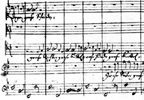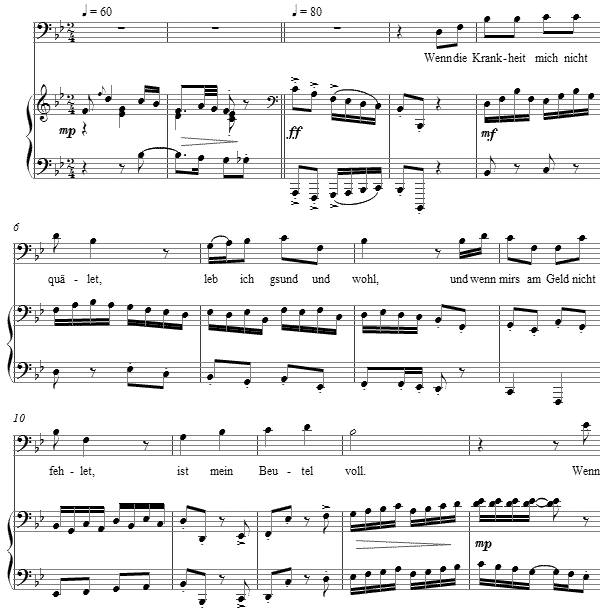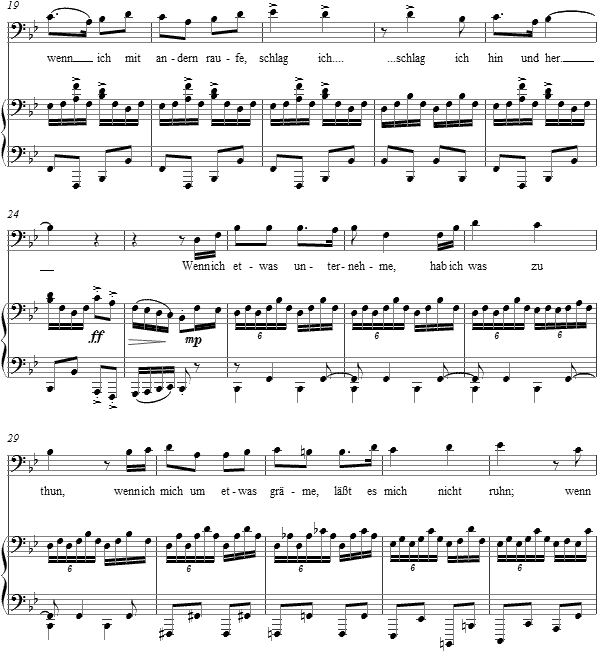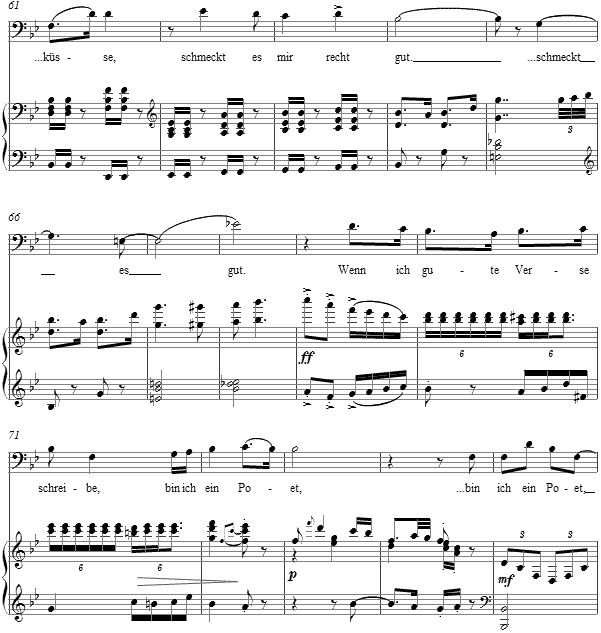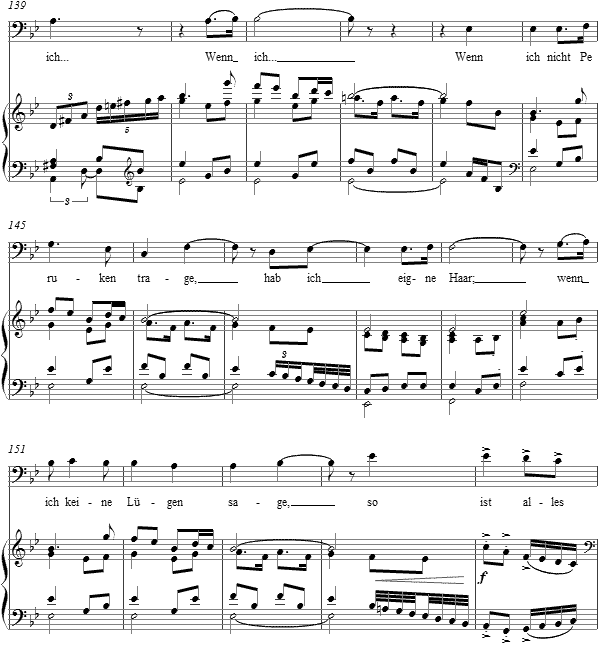Music and Texts of GARY BACHLUND
Vocal Music | Piano | Organ | Chamber Music | Orchestral | Articles and Commentary | Poems and Stories | Miscellany | FAQs
Quodlibet - (2008)
Philipp Hafner
for baritone and piano
Thomas Jesatko gewidmet
Wenn die Krankheit mich nicht quälet,
Leb ich gsund und wohl,
Und wenn mirs am Geld nicht fehlet,
Ist mein Beutel voll.
Wenn ich recht nach Gnügen saufe,
Durstet mich nicht mehr,
Und wenn ich mit andern raufe,
Schlag ich hin und her.
Wenn ich etwas unternehme,
Hab ich was zu thun,
Wenn ich mich um etwas gräme
Läßt es mich nicht ruhn;
Wenn ich im Pirutsche fahre,
Geh ich nicht zu Fuß;
Wenn ich Geld für andre spare,
Hab ich keinen Gnuß.
Wenn ich aif die Leiter steige,
Komm ich in die Höh,
Wenn ich was Geheims verschweige
Sag ich es nicht eh;
Wenn ich wen Bekannten grüße,
Zuck ich Fuß und Hut,
Und wenn ich die Doris küsse,
Schmeckt es mir recht gut.
Wenn ich gute Verse schreibe,
Bin ich ein Poet,
Und wenn ich gut Kegel scheibe
Werf ich auf das Brett;
Wenn ich andern etwas stehle
Hab ich Schuld daran,
Und wenn ich mich heut vermähle,
Bin ich morgen Mann.
Wenn ich auf der Gasse gehe,
Bin ich nicht zu Haus;
Wenn ich auf die Leuthe schmähe,
Schimpf ich sie recht aus;
Wenn ich in der Finster bleibe,
Seh ich keinen Strich;
Wenn ich mir Zeit vertreibe,
So verkürzt sie mich.
Wenn ich nicht Peruken trage,
Hab ich eigne Haar;
Wenn ich keine Lügen sage,
So ist alles wahr;
Wenn ich viele Jahre lebe,
Werd ich Kinderspott,
Und wenn ich den Geist aufgebe,
Bin ich Mause todt.[ 9 pages, circa 4' 30" ]
Excerpt from Bach's manuscript for the Quodlibet (BWV 524)
Philipp Hafner (1731-1764) was an Austrian comedy and farce writer, born in Vienna. Some authorities cite his birth year as 1735, but there is little known of the man or his life, aside from his work. He apparently studied law in a Jesuit school. His principal works which straddle the Baroque and Enlightenment periods were: Der alte Odoardo und der lächerliche Hanswurst (1755), Der Freund der Wahrheit (1760), Die bürgerliche Dame (1763), Die reisenden Komödianten (1774), Dramatische Unterhaltungen unter guten Freuden (1774). After his death due to tuberculosis, his collected comedies were published by Joseph Sonnleithner in 1812 (Vienna).
When sickness does not torment me,
I live healthy and well,
And when my money does not go missing
Is my money bag full.
When I drink for happy pleasure
Then I thirst no longer,
And when I contend with others,
I strike them here and there.
When I attempt something,
I have something to do,
When I have something to grieve,
It will not let me rest;
When I travel by coach,
I do not go by foot;
When I economize,
Then I have no joy.
When I climb a ladder,
I come into the heights,
When I conceal a secret
I say nothing at all;
When I greet an acquaintance,
I bow and doff my hat,
And when I kiss Doris,
It delights me right well.
When I write a good rhyme,
I am a poet,
And when I bowl well,
I drop it on the floor;
When I steal from others,
I have guilt for that,
And when I marry this day,
Tomorrow I am a husband.
When I go through the street,
I am not at home;
When I revile others,
I tell them off quite well;
When I remain in darkness,
I see nothing;
When I idle away the hours,
Then I cut short my time.
When I wear no wig,
I have my own hair;
When I tell no lie,
Then all is true;
When I live many years,
I will become senile,
And when I give my soul away,
Then I am door-nail dead.
A quodlibet, translated "that which pleases" for the Latin phrase "quod libet," was first a form of teaching in the medieval university -- universitas, for a universe of learning -- at which questions on any topic which pleased the audience were put to a teacher. These questions and their answers were often published, such as the Quaestiones de quodlibet of Thomas Aquinas.
In music, the quodlibet became a piece of music combining several different melodies usually in counterpoint, sometimes quoting popular tunes, and often in a light-hearted manner. Of three types usually differentiated by the theorist, the catalogue quodlibet consists of a free setting of catalogue poetry (usually humorous lists of loosely related items); the successive quodlibet quotes short musical and textual quotations in one voice while the other voices provide accompaniment; the simultaneous quodlibet combines two or more pre-existing melodies. J. S. Bach's "Quodlibet" (BWV 524), is not a quodlibet by any of the above definitions, but a ten-minute long work of nonsense, dumb jokes, puns, obscure cultural references, word games, and parody of other songs. Some scholars believe it not to be a work by Bach for its irreverent tone; to my notion, that is not reason enough to evidence such suspicion.
For this quodlibet to the text of the same name, I chose as my "quotations" the twenty songs of Die schöne Müllerin (Opus 25) by Franz Schubert, as well as a short reference to Tristan and a final gesture in the major reminiscent of the minor tonality of Schubert's Erlkönig. If one is to make a parody "that pleases," then this setting is 1) a "successive" catalogue of musical snippets to accompany the text and vocal line, and 2) "that which pleases" me.
The opening gesture which repeats thematically throughout this quodlibet as a kind of curtain between sections is drawn from Schubert's Morgengruß.
At measure 19 and following, a snippet from the accompaniment figure to Das Wandern, followed by a truncation of gestures from Wohin? beginning at measure 26.
Without cataloging all the song citations, one finds below the gestures drawn from Am Feierabend, Der Neugierige and its morphing towards the Prelude from Tristan und Isolde, followed by a citation from Ungeduld, and the accompaniment figure from Des Müllers Blumen.
The excerpt below twice weds quotes from Des Baches Wiegenlied with Morgengruß, while altering the harmonic mode slightly, leading to a final statement of Hafner's Quodlibet in a change of key to E flat major allowing the voice to proclaim its last lines reaching the highest note of the setting, F.
Thomas Jesatko
Thomas Jesatko comes from Nürnberg and first studied Literature, German und Social Sciences in Erlangen, before studying voice at the conservatories in Nürnberg and Munich. In 1986 he was engaged by the Staatstheater Darmstadt, and in 1991 moved to the Städtischen Bühnen Osnabrück, finally coming in 1997 to the Nationaltheater Mannheim. Jesatko has been a guest soloist in Leipzig, Hannover, Paris, Köln, Straßburg und Schwetzingen. His repertoire includes all the major Mozart roles, as well as Jochanaan (Salome), Kurwenal (Tristan und Isolde), Klingsor (Parsifal), Tonio (Pagliacci), Escamillo (Carmen), Kaspar (Der Freischütz), Alberich (Der Ring des Nibelungen) und Sarastro (Die Zauberflöte). His first appearance at Bayreuth was in 2007. We has recently sung together in concert performances of Parisfal, Act Two, with the Sinfonie Orchester Aachen, and I thought to compose something for this marvelous baritone.
The score for Quodlibet is available as a free PDF download, though any major commercial performance or recording of the work is prohibited without prior arrangement with the composer. Click on the graphic below for this piano-vocal score.
